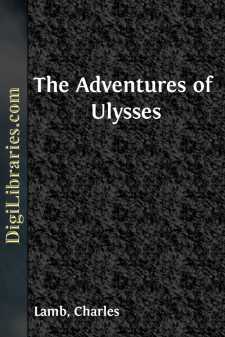Categories
- Antiques & Collectibles 13
- Architecture 36
- Art 48
- Bibles 22
- Biography & Autobiography 813
- Body, Mind & Spirit 142
- Business & Economics 28
- Children's Books 17
- Children's Fiction 14
- Computers 4
- Cooking 94
- Crafts & Hobbies 4
- Drama 346
- Education 46
- Family & Relationships 57
- Fiction 11829
- Games 19
- Gardening 17
- Health & Fitness 34
- History 1377
- House & Home 1
- Humor 147
- Juvenile Fiction 1873
- Juvenile Nonfiction 202
- Language Arts & Disciplines 88
- Law 16
- Literary Collections 686
- Literary Criticism 179
- Mathematics 13
- Medical 41
- Music 40
- Nature 179
- Non-Classifiable 1768
- Performing Arts 7
- Periodicals 1453
- Philosophy 64
- Photography 2
- Poetry 896
- Political Science 203
- Psychology 42
- Reference 154
- Religion 513
- Science 126
- Self-Help 84
- Social Science 81
- Sports & Recreation 34
- Study Aids 3
- Technology & Engineering 59
- Transportation 23
- Travel 463
- True Crime 29
The Adventures of Ulysses
by: Charles Lamb
Categories:
Description:
Excerpt
CHAPTER ONE
The Cicons.—The Fruit of the Lotos-tree.—Polyphemus and the Cyclops.—
The Kingdom of the Winds, and God Aeolus's Fatal Present.—The
Laestrygonian Man-eaters.
This history tells of the wanderings of Ulysses and his followers in their return from Troy, after the destruction of that famous city of Asia by the Grecians. He was inflamed with a desire of seeing again, after a ten years' absence, his wife and native country, Ithaca. He was king of a barren spot, and a poor country in comparison of the fruitful plains of Asia, which he was leaving, or the wealthy kingdoms which he touched upon in his return; yet, wherever he came, he could never see a soil which appeared in his eyes half so sweet or desirable as his country earth. This made him refuse the offers of the goddess Calypso to stay with her, and partake of her immortality in the delightful island; and this gave him strength to break from the enchantments of Circe, the daughter of the Sun.
From Troy, ill winds cast Ulysses and his fleet upon the coast of the Cicons, a people hostile to the Grecians. Landing his forces, he laid siege to their chief city, Ismarus, which he took, and with it much spoil, and slew many people. But success proved fatal to him; for his soldiers, elated with the spoil, and the good store of provisions which they found in that place, fell to eating and drinking, forgetful of their safety, till the Cicons, who inhabited the coast, had time to assemble their friends and allies from the interior; who, mustering in prodigious force, set upon the Grecians, while they negligently revelled and feasted, and slew many of them, and recovered the spoil. They, dispirited and thinned in their numbers, with difficulty made their retreat good to the ships.
Thence they set sail, sad at heart, yet something cheered that with such fearful odds against them they had not all been utterly destroyed. A dreadful tempest ensued, which for two nights and two days tossed them about, but the third day the weather cleared, and they had hopes of a favourable gale to carry them to Ithaca; but, as they doubled the Cape of Malea, suddenly a north wind arising drove them back as far as Cythera. After that, for the space of nine days, contrary winds continued to drive them in an opposite direction to the point to which they were bound, and the tenth day they put in at a shore where a race of men dwell that are sustained by the fruit of the lotos-tree. Here Ulysses sent some of his men to land for fresh water, who were met by certain of the inhabitants, that gave them some of their country food to eat—not with any ill intention towards them, though in the event it proved pernicious; for, having eaten of this fruit, so pleasant it proved to their appetite that they in a minute quite forgot all thoughts of home, or of their countrymen, or of ever returning back to the ships to give an account of what sort of inhabitants dwelt there, but they would needs stay and live there among them, and eat of that precious food forever; and when Ulysses sent other of his men to look for them, and to bring them back by force, they strove, and wept, and would not leave their food for heaven itself, so much the pleasure of that enchanting fruit had bewitched them....










